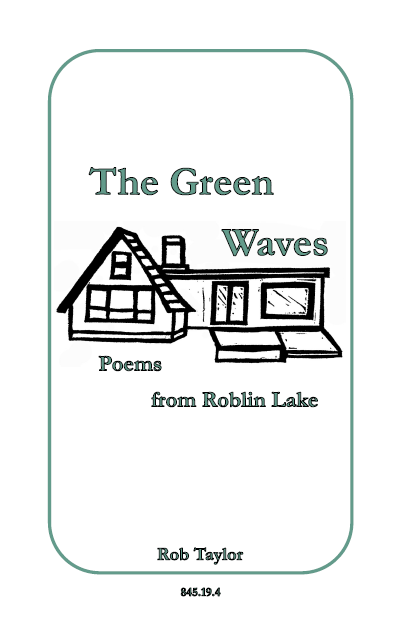
The Green Waves: Poems from Roblin Lake
Rob Taylor
845 Press, 2019
Review by Andrew French
Rob Taylor’s The Green Waves (845 Press, 2019) transports readers to Al Purdy’s A-frame cabin on Roblin Lake through an inquisitive uncertainty about that unique space. Much of The Green Waves considers Taylor’s relationship to Purdy, the complexity of which undoubtedly increased when the chapbook’s author was named one of the inaugural writers-in-residence at the A-frame. Occupying the same space in which Purdy once lived and wrote, Taylor comes to consider the life of the poet whose rooms he fills in this short collection.
In “Cemetery,” Taylor admits he likely would not have been Purdy’s favourite person—“I don’t drink. / I make nice. I stunt my opinions,” Taylor writes. Readers can see Taylor’s complex relationship to Purdy evolving across the twenty-three pages of poems that compose the chapbook, with Taylor’s curiosity and determination to reconcile that relationship entertainingly evident throughout. Taylor’s approach to Purdy’s legacy honours the late poet’s impact on the area in which these poems transpire, while simultaneously breaking and forming connections to Purdy as the text goes on.
Taylor’s writing suggests he is aware of the ongoing efforts to preserve, historicize, and in many instances exaggerate Purdy’s A-frame, a space that few would expect to carry the significance that it does upon first glance. In “The Point,” Taylor marvels at how “a few people doing / and a few more talking” can “turn some scrap of land hallowed.” To be sure, Purdy’s cabin is but a simple building on the shore of an oversized pond, and Taylor calls a spade a spade, but in The Green Waves Taylor effectively reflects Purdy’s search for the significance that hides in simplicity. Expressing a respect and admiration for Purdy’s contribution to Canadian writing, Taylor looks for something of his own to learn from the late poet’s “scrap of land,” and that something comes in the form of the relationships Taylor forms with the people around him.
It is the juxtaposition of Taylor’s budding family life against a historical space geared towards remembrance that provides the most significant reflections in this chapbook. In “Tell Me If You Can,” for instance, Taylor’s son takes his first crawl “sidewise under Eurithe’s wingback,” bringing the early stages of new life into a historical space that is associated chiefly with everything that Al and Eurithe Purdy once achieved there. Taylor writes to Al Purdy of the A-frame in the same poem, saying that he comes “now for the place, not for you, / which was your point.” Regardless of Purdy’s intention, Taylor’s time at the A-Frame cements his role as a father, something upon which he meditates thoughtfully across the poems in this collection.
While Taylor’s family is just beginning during the time at which many of the poems in The Green Waves take place, the passing of time as well as Purdy’s death clash powerfully with this tone of youthful potential. Taylor writes through the deaths of his father and a former student in raw and honest poems that merit and stand up to re-reading. In “Lyric,” a poem that considers the death of his father, Taylor creates powerful images of “words as wards against three waves / of chemo,” while also maintaining a sincere uncertainty about life through descriptions of existence as “a stumbling” from door to door. The chapbook certainly occurs at the intersection of the poet’s emerging role as a father and the losses of people for whom he has cared, powerfully asking thought-provoking questions at these intersections instead of the alternative prescription of poetic answers.
With all of the heavy content Taylor covers in The Green Waves, it’s easy to overlook the poet’s excellent grasp of language, but perhaps this is where a review comes in handy. Whether it be describing “the black heart of the artist’s rendering” in “Untitled” or fire “[hissing] its demands” in “Survival,” one need not look far for excellent word choice in Taylor’s poems. The content itself speaking volumes, Taylor’s language employs a musical colloquialism that would have made Purdy proud for its ability to let the events of the poems shine brightest. Taylor’s language allows the things he experiences to speak for themselves, a task much easier described than accomplished, and much more effective than the alternative in this instance. With moments of flourishing descriptive skill, it is the subtlety of Taylor’s voice that is most astounding in this collection.
The Green Waves is a strong, careful consideration of the complex history tied up in the Al Purdy A-frame and the ways in which it intersects with the poet’s personal life within that space. Regardless of one’s knowledge of or interest in Purdy’s life and work, this is a short collection that is certainly worth picking up for its honest consideration of the difficult moments we encounter in our lives. Taylor poses important questions to which nobody has the same answer, though it seems as if all of us ask them. How do we remember the people we have lost? What about those who came before us? How can we move forward in light of the past? Taylor won’t give you his answer in The Green Waves, but the chapbook might help to illuminate your own.
Andrew French was born and raised in North Vancouver, British Columbia. French holds an Honours BA in English from Huron University College at Western University and is pursuing an MA in English at UBC. His poems and book reviews have recently appeared in Train: a poetry journal, The Lamp, The Hamilton Review of Books, PRISM International, and a number of other journals across North America and the UK. French grills his favourite emerging and established writers on Page Fright: A Literary Podcast.